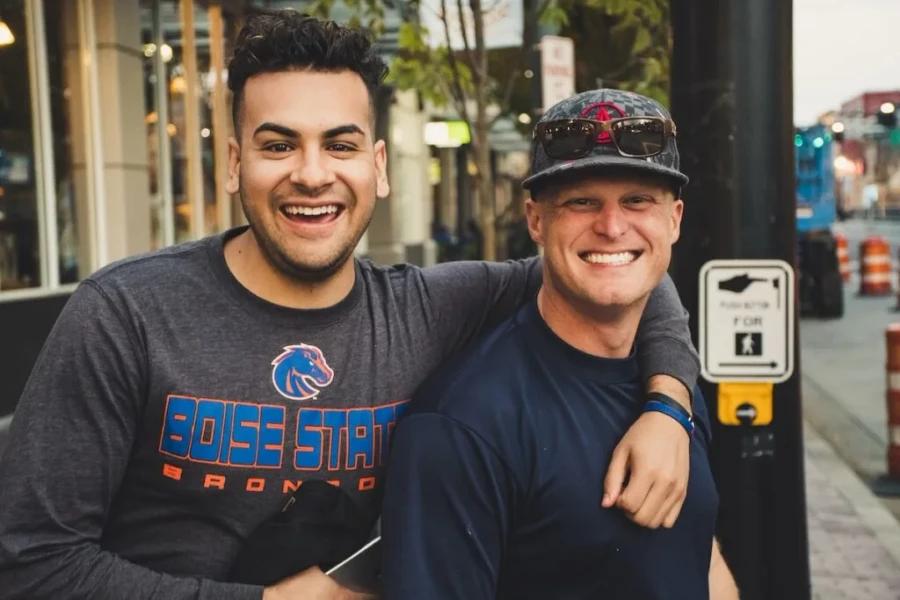39 Psychological Facts About Friendship (2022) Most People Don’t Know I Interesting Facts
Curated from: newinterestingfacts.com
Ideas, facts & insights covering these topics:
42 ideas
·45.1K reads
95
2
Explore the World's Best Ideas
Join today and uncover 100+ curated journeys from 50+ topics. Unlock access to our mobile app with extensive features.
Having solid friendships is an important aspect of your emotional well-being. In good times and bad times, your best friend is usually the first person you call. But having a good group of friends isn’t just good for your emotional state; it can be good for your physical well-being and even your job performance.
These psychological facts about friendships shed some interesting light on many different aspects of human behavior . Keep your phone handy; when you’re done reading these friendship facts, you might just feel an urge to call or message your besties and plan a catch-up.
143
2.2K reads
Psychological Facts About Friendship
Let’s dive into all the psychological reasons having friends is so important. This list will definitely make you value your nearest and dearest even more.
136
2.32K reads
1. Having Friends Is Good for Your Health
Having a group of friends is good for your health and wellbeing. It comes with many benefits, like improving your self-confidence and increasing your sense of purpose and belonging. Friends can also boost your happiness, reduce the stress of everyday life, and help you overcome depression .
And if you’re going through a traumatic experience, like the death of a loved one, divorce, serious illness, or a job loss, they can help you cope with that too.
141
1.79K reads
2. People Overcome Illness Better When They Have Friends
When faced with a major illness, people who have a strong support system are more likely to survive. It’s also been shown that people who have a good group of friends live longer.
137
1.85K reads
3. Hanging Out With Friends Can Make You Look More Attractive
Being out with a group of friends can make you appear more attractive. This is known as the cheerleader effect, and it describes the phenomenon where people’s faces look more attractive when they’re next to other faces as opposed to when they’re seen in isolation.
142
1.72K reads
4. Animals Have Friends Too
Want to know a fun animal fact ? Certain mammals, like horses, hyenas, elephants, dolphins , chimpanzees, and baboons, form friendships too. They even form bonds with animals from other species.
But what is the benefit of animals having friends, you may ask? Well, it’s believed that they form friendships for similar reasons that humans do; it reduces their stress, leads to better health, and can even help with their reproductive success.
138
1.4K reads
5. Your Friend Group Size Will Stay the Same Throughout Your Life
It’s likely that the average number of friends you have will stay the same throughout the majority of your life. So whether you’re someone who has a small social circle, or a large one, that’s likely to remain the same throughout your years.
136
1.71K reads
6. You’ll Make Nearly 400 Friends in Your Lifetime
It’s estimated that you’ll make roughly 396 friends in your lifetime. However, only a handful of them last.
141
1.76K reads
7. Most Friendships Don’t Last Very Long
People form many friendships during their life, but generally, only 1 out of 12 friendships are so close that they last a lifetime.
137
1.74K reads
8. When It Comes to Friends, Quality Over Quantity Is More Important
The quality of your friendships is much more important than your number of friends. Just because someone has more friends than you doesn’t mean they have more meaningful relationships .
140
1.57K reads
9. Work Friends Are Very Important
Having friends in your workplace makes your job more enjoyable. It also makes you more creative, happy, productive, and less likely to seek out a new job elsewhere.
A Gallup poll from 2018 found that those who have a good work friend are more likely to be engaged in their jobs, deliver higher-quality work, and have a better sense of well-being.
Also, when faced with difficult situations on the job, employees who report having a work friend display lower stress levels.
141
1.21K reads
10. Friendships Need to Be Matched in Their Give and Take
Studies show that relationships are much more likely to last if both members feel like they’re getting as much out of the relationship as they’re putting it.
So if you’re always the one who has to make plans to meet up with your friends, and they’re not putting in as much effort, the friendship is more likely to fizzle out.
142
1.21K reads
11. Love Can Cost You Friendships
Want to know a psychological fact about love and friendship? When you become romantically involved with someone new, it can weaken your friendships. Studies show that two people from your close circle, usually a friend and a family member, will become displaced.
Your new love interest will take up some of the time that you would normally be spending seeing your friends, which can result in friendships deteriorating.
143
1.22K reads
12. The Strongest Friendships Are Formed From the Ages of 18 and 26
From about 18 to 26 years old, you’re more likely to try out new things, which leads to meeting new people. As you get older, commitments, like marriage and children, can cause your free time to shrink, which also makes it harder to meet new people.
140
1.23K reads
13. Women Value Friendships Based on Emotional Connections
The friendship dynamic between males and females is usually quite different. The friendships that women have usually come with intimacy and emotional connections. They like to share personal details of their life with their friends.
Women also need to maintain regular contact with someone to consider them true friends. If a long period of time has passed without speaking to someone, they are more likely to assume that they’ve grown apart and that the friendship is over.
146
1.06K reads
14. Men Value Friendships That Are Activity Based
An interesting fact about men is that they prefer friendships that are centered on activity. They enjoy doing things together like watching a game or playing a sport. They don’t feel as strong of a desire to share intimate details with people outside of their family.
Men can also go long periods of time without having contact with a friend, even years, and still consider that person a close companion. And, if they happen to have an argument with one of their pals, they’re more likely to move on and continue their friendship than women are.
142
1.02K reads
15. It’s Harder to Make Friends When You’re an Adult
Making new friends when you’re an adult is hard. You may not have as many chances for social connection as you once had in high school and college. Adults are also busier, and establishing new friendships takes time, commitment, and effort.
135
1.03K reads
16. Your Close Friends Can Influence Your Eating Habits
It turns out your best friends can have an impact on your weight. If your close friends eat a healthy diet, you’re more likely to do the same. But if they eat junk food often, you might notice yourself start to squeeze into your jeans.
134
940 reads
17. Trusted Friendships Are on the Decline
A 2004 study from the American Sociological Review found that the average number of friends that Americans have has fallen by a third in the past 20 years.
The researchers suspected that these changes may stem from an increase in the number of hours that people spend at work as well as the influence of internet communication. This has led to a decrease in the size of close-knit groups of friends and relatives.
131
831 reads
18. Friendships Make You More Empathetic
It’s true, friends bring out your empathic side. It’s been shown in studies that your brain reacts the same way when you are in danger as when your friend is in danger. This is because people associate their true friends with their very own selves.
136
793 reads
19. There Is a Limit to the Number of Friends You Can Have, Supposedly
According to anthropologist Robin Dunbar, people can only maintain a max of 150 casual friendships. This number is referred to as Dunbar’s number , and it’s based on a part of the brain (the neocortex) which is associated with cognition and language.
According to the hypothesis, its size sets an upper limit on the number of social relationships that primate brains can successfully maintain. Although, not everyone subscribes to this theory, especially with the role social media now plays in some people’s lives.
134
794 reads
20. Babies Recognize Friendships Before They Can Even Talk
It turns out babies may know more about the social world than you think. According to a study from the University of Chicago, infants as young as nine months old can understand social relationships.
Babies are able to observe strangers interacting and then make inferences on whether the two people are friends.
134
800 reads
21. There’s a Scientific Difference Between Friends and Acquaintances
According to behavioral scientists and psychologists, a close friendship involves an ongoing bond of sacrifice and shared moments. Also, a true friend holds your happiness in high regard, and you miss each other when you go long periods of time without seeing one another.
136
895 reads
22. Every Seven Years, You’ll Lose Half of Your Friends
You may notice your social media following rise over the years. However, as far as close friends go, about every seven years, you’ll lose half of your friends. The ones you’ve lost will be replaced by new friends, which will keep your social circle around the same number.
So if your friendship lasts for more than seven years, it’s likely it will continue for life.
137
765 reads
23. It’s Debatable Whether Men and Women Can Actually Be Friends
Whether heterosexual men and women can be friends is debatable. A study on cross-sex friendship found that it might be possible in some cases. However, males were much more likely to feel some sort of attraction to their female friends than vice versa, which could result in negative consequences in long-term friendships.
Also, jealousy from romantic partners was another factor that led to cross-sex friendships not working out.
144
875 reads
24. Friends Help You Stick to Your Goals
Whether you’re trying to start a healthy habit, or get rid of a bad one, having a friend by your side will make it easier. Having a BFF that helps keep you accountable will make you 20% more likely to stick to your goals.
137
757 reads
25. Friends Make You Feel Fearless
When you’re with your friends, you perceive things as being less risky. Even in dangerous situations, things don’t seem as scary when your buddy is by your side.
136
713 reads
26. You Mimic Your Friends
People who spend a lot of time together tend to pick up on each other’s habits. You may notice that you start to use phrases that your friend uses more. Or, if your bestie is really into a certain sport or activity, you may also start liking it.
133
671 reads
27. Friendship Is a Vital Factor in Romantic Relationships
Friendship just might be the key to having a soulmate relationship . Couples that are best friends genuinely enjoy spending time with one another much more. And having a solid friendship is the foundation of a healthy and stable relationship; it’s even more important than physical intimacy.
139
747 reads
28. If You Don’t Have Friends, the Risk of Succumbing to Cancer Goes Up
A study from the journal Cancer suggests that having close social ties makes you more likely to beat cancer. It found that patients with early-stage breast cancer who didn’t have a social group may have a greater risk of dying from the disease than those with friendships.
135
679 reads
29. Friends Make You More Productive
Studies show that having a good friend who is always there for you will make you more productive in life.
132
715 reads
30. The Majority of Childhood Friends Don’t Last Into Adulthood
The same study published by OnePoll also looked into relationships with childhood friends. It found that only three in ten Americans say they have a lasting connection with people they were friends with in their childhood.
131
696 reads
31. Childhood Friends Are Very Important
The friendships you form in early childhood are very important. Not only are these relationships a crucial part of your emotional growth, but they also promote positive mental health at a young age. Through engaging with your young friends, you learned important social cues and how to interact with others.
131
652 reads
32. You Might Share 1% of Your DNA With Your Best Friend
A study from Yale University and the University of California at San Diego found that your closest friends might be genetically similar to you. The study took data from 2,000 friends and found that you can share as much as 1% of the same gene variants as your friends. This is as close as fourth cousins.
134
670 reads
33. Many Adults Find It Hard to Make New Friends
A study published by OnePoll in conjunction with Evite looked into the social dynamics of Americans. It found that roughly 45% of adults say they find it challenging to make new friends.
It also revealed that the average American hasn’t formed a new friendship in five years.
One of the main reasons cited for struggling to widen their social circle was introversion or shyness. The same 45% who say it’s a struggle to make new friends said that they would attempt to if they knew how to or had more opportunities.
134
596 reads
34. Most Friends Share a Similar Age
Research shows that you’re much more likely to form friendships with people of the same age or in the same age group as yourself. This is likely because we’re more inclined to be friends with people who are similar to us .
130
611 reads
35. Intergenerational Friendships Make You Smarter
Even though people tend to make friends with others who share a similar age, having friends from different age groups might come with many benefits.
Having friends from different generations gives you a much wider perspective on things. It can also make you more open-minded and resilient.
137
689 reads
36. There Are Five Criteria for a Good Friendship
Bill Rawlins, a researcher from Ohio University, put out five criteria to define what a true friendship is. It should be:
- Voluntary : you can’t force someone to be your friend.
- Affectionate : you need to genuinely like each other.
- Personal : you need to have a close relationship
- On equal grounds: you need to have the same rights and conditions as each other.
- Mutual : both people need to feel the same way about the friendship.
148
699 reads
37. Most Americans Have a Best Friend
Nearly 6 in 10 (59 %) of Americans report having at least one person they consider their best friend. However, this number is lower than it once was. In 1990, 75% of Americans said that they had a best friend.
131
662 reads
38. You May Be a Bad Judge of Your Friends
You may have a poor perception of your own friendships. According to research from Tel Aviv University and Massachusetts Institute of Technology, only half of your friends consider you their own buddy.
133
740 reads
39. Millennials Are a Very Share-Happy Generation With Their Friends
Out of all the generations still alive today, millennials are the most share-happy with their friends. This makes sense considering they are also the MySpace and Facebook generation.
The participants in the study were asked if they’d share information on a variety of topics with their friends. In every category, millennials were the least likely to keep something to themselves. Gen Z came in second place.
135
773 reads
IDEAS CURATED BY
CURATOR'S NOTE
39 Psychological Facts About Friendship
“
Tom Joad's ideas are part of this journey:
Learn more about personaldevelopment with this collection
How to make rational decisions
The role of biases in decision-making
The impact of social norms on decision-making
Related collections
Similar ideas
24 ideas
21 Psychological Facts About Sadness (2023) Most People Don't Know I Interesting Facts
newinterestingfacts.com
26 ideas
23 Psychology Facts about Lying (2022) Most People Don't Know I Interesting Facts
newinterestingfacts.com
44 ideas
41 Psychological Facts About Crying
newinterestingfacts.com
Read & Learn
20x Faster
without
deepstash
with
deepstash
with
deepstash
Personalized microlearning
—
100+ Learning Journeys
—
Access to 200,000+ ideas
—
Access to the mobile app
—
Unlimited idea saving
—
—
Unlimited history
—
—
Unlimited listening to ideas
—
—
Downloading & offline access
—
—
Supercharge your mind with one idea per day
Enter your email and spend 1 minute every day to learn something new.
I agree to receive email updates










